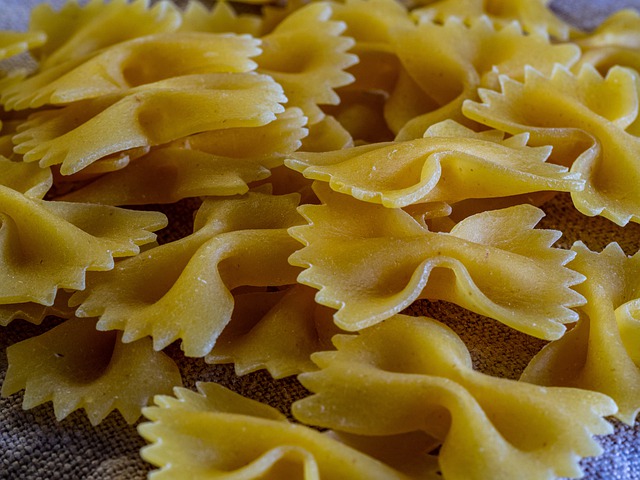
If you have a box of spaghetti or any other type of dry pasta stored away in your cupboard, you might be wondering if there’s an expiration date for this type of food.
Does dry pasta expire? Does dry pasta go bad at some point?
The answer is that there’s no expiration date on dry pasta, but there are some shelf life guidelines that you should follow to ensure maximum freshness.
When properly stored, especially when kept in an airtight container, dry pasta can last for years.
However, as is the case with most foods, if you fail to follow the right storage guidelines, you’ll run the risk of your pasta going bad before its time.
That’s why it’s important to know exactly how to keep your pasta at maximum freshness when you’re making any decision about whether or not your kitchen cabinets are the best place for it.
After all, this food is too tasty to be left to spoil.
How does pasta go bad?
Spaghetti and other types of dry pasta don’t spoil as such.
If you’ve kept your spaghetti in an airtight container, it won’t grow mold or become dangerous to eat in any way.
However, your spaghetti will go stale and lose its flavor if you don’t follow proper storage guidelines.
There are three factors that contribute to the loss of flavor in dry pasta: heat, moisture, and oxygen.
Heat speeds up all types of chemical reactions that can alter the chemical makeup of your food, and it also acts as a catalyst for other reactions that might take place.
Moisture helps to give mold a friendly place to grow and encourages the growth of other bacteria, especially if there’s any type of food left exposed on your container.
Oxygen also encourages mold growth and it causes many types of foods to lose their flavor over time, as it reacts with fatty acids.
If you want to store your dry pasta longer, you need to take these factors into consideration.
Pasta storage guidelines
If you want to make sure that your spaghetti stays fresh as long as possible, these are the storage guidelines you should follow:
Humidity is the one factor that dry pasta can’t really avoid.
Because of its lack of natural moisture, you’ll need to add some type of moisture to your spaghetti in order for it to keep its best quality.
Add a teaspoon of cooking oil to your spaghetti before you store it.
This will help to preserve its flavor and ensure that there’s no chance of it taking on other flavors in the packaging.
Don’t buy more spaghetti than you can use within a few months, and always transfer your dry pasta into airtight containers after your purchase.
Keep your spaghetti in a dark, cool place, and always check before you buy more dry pasta, just to be sure that your supply is still good.
To make sure that you’re getting the best value for your money and still letting your spaghetti reach its full lifespan, follow these pasta shelf life guidelines:
- Keep your spaghetti in an airtight container at all times.
- Transfer your dried spaghetti into airtight containers as soon as you buy it – don’t let your pasta sit out in the open.
- Check to make sure that there aren’t any holes in your airtight container.
- Always store the pasta in a dark, cool place – don’t put it on the counter and don’t leave it in a hot place.
- Always use dry spaghetti within three months of purchase to make sure it tastes its best.
- Discard any spaghetti that’s past its prime.
What happens to dry pasta when it expires?
As I explained above, dry pasta doesn’t expire in the same way that other types of food do.
Because it lacks moisture and has a long shelf life, dry spaghetti will last for a few years even if you don’t follow any guidelines.
However, your dried spaghetti does have its peak flavor, and after that point, it will lose its freshness.
If you’re following our guidelines, your spaghetti should have a shelf life of around three months.
If you find that your pasta is losing its flavor after that point, throw it out.
Even though dry spaghetti won’t grow mold or become dangerous to eat if it loses its flavor it might as well be a completely different type of food.
If you’re planning on stocking up on spaghetti, make sure to check your expiration date before you buy more.
Once you’ve opened your spaghetti, be careful about making it last as long as possible.
Store your open spaghetti in an airtight container and keep it fresh by following the guidelines we’ve mentioned above.
That being said, expiration dates don’t have to carry a lot of weight if you’re willing to put in the extra effort.
If you’re willing to follow the guidelines we’ve set out above, you can be sure that your spaghetti will last for as long as possible without worrying about it going bad.
Can dry pasta be used after the expiration date?
As long as you’re buying high-quality spaghetti and taking care of it properly, there shouldn’t be a problem with it going bad.
As long as you’re storing high-quality dried spaghetti properly, there’s no reason to worry about it having an expiration date.
In fact, as I’ve said above dry spaghetti has a long shelf life and won’t expire for years even if you don’t take the proper precautions.
Of course, if you’re finding that your spaghetti has a funny taste or smells bad after following our storage guidelines, it’s time to throw it away.
Final Thoughts
Dry pasta doesn’t expire in the same way that other foods do.
Long after its printed expiration date, spaghetti will still be safe to eat and won’t grow mold.
Just make sure to store your spaghetti properly and it will last for years.
But if you can consume the pasta within three months of purchase, it will be much better.
I hope you found this helpful.
